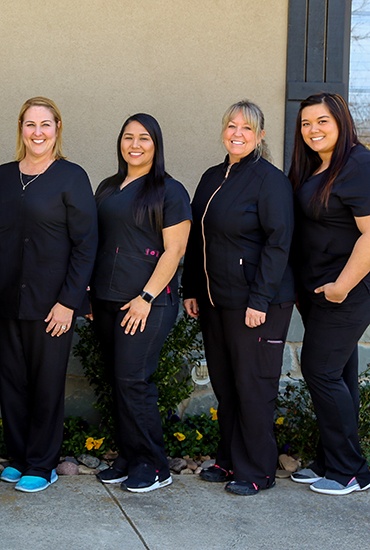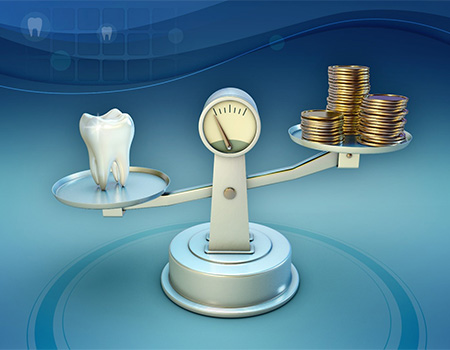
Wisdom Tooth Extractions – Azle, TX
We Address Painful, Frustrating Wisdom Teeth
The last permanent teeth usually erupt during the late teenage or young adult years. These third molars are commonly called wisdom teeth, and they were necessary in the past when tooth loss was more common. However, as oral hygiene has improved, people now often don’t need these extra molars. In fact, they can cause problems by coming in at an unhealthy angle or crowding and pushing the other teeth out of alignment. In these situations, our team at Rubal Dentistry Azle can offer gentle wisdom tooth extractions in Azle, TX to help your smile stay healthy.
Why Choose Rubal Dentistry Azle for Wisdom Tooth Extractions?
- More Than 20 Years of Experience
- All Ages Welcome
- Dental Insurance Accepted
What Are Wisdom Teeth?

Wisdom teeth, also known as third molars, are the final set of teeth that typically emerge in a person's late teens or early twenties. Most adults have four wisdom teeth, one in each corner of the mouth. However, not everyone develops these teeth, and some people may have fewer. Because wisdom teeth can lead to problems like impaction, crowding, infections, and cysts, many dentists recommend their removal to prevent potential complications.
Why Do Wisdom Teeth Need to Be Removed?

There are many reasons why wisdom teeth need to be removed. Some of those causes include:
- Lack of space. Most people do not have enough space in their mouth for these molars to fully erupt and align properly with the rest of the teeth. This can lead to impacted wisdom teeth, where they become trapped beneath the gum line, causing pain and potential infection.
- Crowding and misalignment of the existing teeth. Wisdom teeth can disrupt the bite and potentially require orthodontic treatment to correct.
- Difficult to clean effectively. Since wisdom teeth are harder to clean, they can increase the risk of bacterial growth, gum inflammation, and infections like pericoronitis.
Considering these potential complications, dentists and oral surgeons often recommend removing wisdom teeth preventively, even if they are not causing immediate problems.
What to Expect from the Wisdom Teeth Procedure

If your wisdom teeth have fully emerged from the gum line, their removal should be a fairly straightforward process. We will use a dental instrument called an elevator to gently lift them and then use forceps to grip and extract them from their sockets.
However, if a wisdom tooth is impacted (meaning it is trapped beneath the gum line), the removal procedure becomes more complex. In such cases, we may refer you to a local specialist who specializes in oral surgery. The specialist may need to create incisions in your gums or carefully break the tooth into smaller pieces to facilitate its safe removal.
Recovering from Wisdom Teeth Extraction

If you have frustrating wisdom teeth, schedule an appointment with Dr. Rubal. Our team will walk you through the entire process, including the aftercare. Here are some guidelines to keep in mind as you heal from the extraction procedure:
- Put clean gauze on the extraction site for a few hours after the procedure.
- Allow a blood clot to form and stay on the site. This will protect the vulnerable exposed tissue.
- Eat soft foods and avoid using a straw for at least 48 hours, and slowly build back up to your normal diet.
- Make sure you get plenty of rest, and refrain from strenuous activity for a few days.
Understanding the Cost of Wisdom Tooth Extractions

Wisdom teeth were great tools for our early ancestors. However, today they cause many people more harm than good. It is common for there not to be enough room in the mouth to accommodate wisdom teeth. That’s where wisdom tooth extractions come in. We won’t be able to determine the exact cost of your procedure until you see us in person. Until then, here are some things for you to keep in mind.
Factors That Can Impact the Cost of Wisdom Tooth Extractions

The cost of wisdom tooth extractions can vary on many different factors. Here are the most prominent ones that influence the cost:
- Number of Teeth: Some people don’t develop all four wisdom teeth. Others don’t need all of their wisdom teeth extracted. We will carefully examine your smile to determine what the best solution is for your unique case.
- Impaction: If your wisdom teeth are impacted, the procedure becomes more complex to do. This can increase the cost of your treatment.
Does Dental Insurance Cover Wisdom Tooth Extractions

Dental insurance providers usually cover at least part of the cost of wisdom tooth extractions. However, this also depends on whether you’ve met your deductible or your maximum for the year. The best way to learn about your benefits is to contact your dental insurance provider directly. We can also help you understand what your plan covers. At Rubal Dentistry Azle, we are proud to be in-network with numerous popular dental insurance plans, including Aetna, Blue Cross Blue Shield, Delta Dental, and many more! If you need any help understanding your plan or have any questions, feel free to reach out to one of our friendly team members.
To find out exactly how much you can expect your wisdom tooth extraction procedure to cost, schedule a consultation with us. We are eager to help keep your smile in good health!
Wisdom Tooth FAQs

Whether you’re having wisdom tooth extraction done yourself or want to schedule the procedure for another member of your family, you’ll want to have a clear idea of what to expect on the day of the procedure. If you request an appointment with us, we can answer these questions in person. But that doesn’t mean you can’t start learning more about wisdom teeth right now! Below, you can see the answers to the wisdom teeth questions that we’ve heard the most over the years.
Do Wisdom Teeth Always Have to Be Removed?
As a matter of fact, they do not. In rare cases where there’s enough room in the jaw to accommodate the wisdom teeth without compromising the other teeth, an extraction may not be needed. However, because the wisdom teeth erupt so late, more often than not the space they need to come in properly simply doesn’t exist. If they become impacted or emerge at an angle, they can cause infection issues and irreparable dental damage. That’s why wisdom tooth extraction is usually recommended before the most problematic symptoms occur; if we have any reason to think the wisdom tooth won’t come out normally, we can make arrangements to have it removed.
How Will I Know My Wisdom Teeth Have to Be Removed?
The following are common symptoms of wisdom teeth that should be extracted right away:
- Tooth pain that lasts more than a couple of days.
- Persistent jaw pain.
- Swollen or inflamed gums near the back of the mouth.
- Difficulty with oral hygiene behind the second molars.
- Periodic swelling and bleeding.
- Wisdom teeth that have become fully impacted (meaning they can’t break through the gums).
- Oral infections that happen on a regular basis, especially near the back of the mouth where the wisdom teeth are located.
At What Age Should Wisdom Teeth Be Removed?
The wisdom teeth typically erupt during the late teens or the early twenties, and it’s best to extract them as early as possible. Of course, the exact timing will be different for everyone; some might get wisdom teeth later in life while others won’t get them at all. We can use X-rays to keep track of the current state of your wisdom teeth; that way, you won’t have to wait until you’re already experiencing negative symptoms to know that your wisdom teeth have to be taken out.
How Long Does the Recovery Process Last?
The main part of recovery usually lasts around 3 to 5 days; after that, you should be able to fully return to your normal routine and enjoy a full range of your favorite foods. However, it can take up to 2 weeks for the mouth to completely finish healing after the extraction. During this time, you might notice some swelling of the cheeks and gums as well as minor discomfort that will continue to fade over time. If the pain or swelling suddenly get worse, or if they fail to get better over time, please call us right away so we can advise you on your next steps.
Is Wisdom Tooth Removal Painful?
If you’re concerned that the process of removing your third set of molars will be painful, we have good news: the first step of the procedure is always numbing your mouth thoroughly. So, you don’t have to worry – you’ll be able to relax comfortably in the treatment chair. Plus, we will give you aftercare instructions to help prevent soreness, sensitivity, and general discomfort during the healing process.
Does Everyone Have Wisdom Teeth?
Although wisdom tooth removal is often looked at as a rite of passage, some people simply don’t have any. In fact, an article published in the Dental Research Journal estimated that upwards of 37% of the population never develop a third set of molars. So, if your parents or grandparents never had wisdom teeth, there’s a chance you may not either!
How Should I Prepare for My Wisdom Tooth Extraction?
Proper preparation is just as important as restful recovery. One of the first steps we recommend taking is cutting out all alcohol and tobacco products. Then, in the days leading up to your procedure, stock up on everything you need – from soft foods and cold compresses to over-the-counter pain medication. The night before, do your best to get good sleep, and choose something comfortable to wear the morning of.
Important note: If you are being sedated for the procedure, then you will also need to arrange for someone you know and trust to drive you to and from your appointment.
